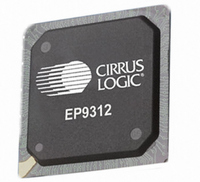EP9312-CB Cirrus Logic Inc, EP9312-CB Datasheet - Page 598

EP9312-CB
Manufacturer Part Number
EP9312-CB
Description
System-on-Chip Processor
Manufacturer
Cirrus Logic Inc
Series
EP9r
Datasheets
1.EP9307-CRZ.pdf
(824 pages)
2.EP9312-IBZ.pdf
(4 pages)
3.EP9312-CB.pdf
(62 pages)
4.EP9312-CB.pdf
(17 pages)
Specifications of EP9312-CB
Peak Reflow Compatible (260 C)
No
A/d Converter
12 Bits
Leaded Process Compatible
No
No. Of I/o Pins
65
Package / Case
352-BGA
Core Processor
ARM9
Core Size
16/32-Bit
Speed
200MHz
Connectivity
EBI/EMI, EIDE, Ethernet, I²C, IrDA, Keypad/Touchscreen, SPI, UART/USART, USB
Peripherals
AC'97, DMA, I²:S, LCD, LED, MaverickKey, POR, PWM, WDT
Number Of I /o
16
Program Memory Type
ROMless
Ram Size
32K x 8
Voltage - Supply (vcc/vdd)
1.65 V ~ 3.6 V
Data Converters
A/D 8x12b
Oscillator Type
External
Operating Temperature
0°C ~ 70°C
Processor Series
EP93xx
Core
ARM920T
Data Bus Width
32 bit
3rd Party Development Tools
MDK-ARM, RL-ARM, ULINK2
Lead Free Status / RoHS Status
Contains lead / RoHS non-compliant
Eeprom Size
-
Program Memory Size
-
Lead Free Status / Rohs Status
No
Other names
598-1257
Available stocks
Company
Part Number
Manufacturer
Quantity
Price
Part Number:
EP9312-CB
Manufacturer:
CIRRUS
Quantity:
20 000
- EP9307-CRZ PDF datasheet
- EP9312-IBZ PDF datasheet #2
- EP9312-CB PDF datasheet #3
- EP9312-CB PDF datasheet #4
- Current page: 598 of 824
- Download datasheet (13Mb)
17
17-2
IrDA
EP93xx User’s Guide
17.3.1 Overview
17.3.2 Functional Description
17.3 Shared IrDA Interface Feature
This section describes features common to the MIR and FIR interfaces (the SIR interface has
been designed to share the enable register and device pins but is otherwise a separate
interface assumed to be controlled by UART2).
The Slow Infrared (SIR) Encoder/Decoder is used to modulate and demodulate serial data
using the Hewlett-Packard
transmit data from UART2 is modulated using return-to-zero (RTZ) encoding to produce an
output to drive the Ir transmitter LED, while data received from the Ir detector is converted
into a serial bit stream to drive a UART's serial input. The SIR supports data rates up to
115.2 kbit/s.
The Medium Speed Infrared (MIR) Encoder/Decoder encodes/decodes peripheral bus data
according to a modified HDLC standard, using flag characters, bit stuffing and a 16 bit CRC
checker. MIR uses the same RTZ modulation and demodulation scheme used by the SIR.
Two signal bit rates are supported: 0.576 Mbit/s and 1.152 Mbit/s.
The Fast Infrared Encoder/Decoder (FIR) operates at a fixed bit rate of 4 Mbit/s.
Modulation/demodulation is by a phase shift key scheme called pulse position modulation
(4 PPM). One of four signalling symbols represent each possible pair of data bits. Data
encoding uses a packet format that prefixes bit and symbol synchronization flags to data and
appends a 32-bit CRC and stop flag to the end of each packet. The start and stop flags use
signalling symbols that are not used to encode data, hence bit stuffing of data is not required
in this mode.
Only one of the Encoder/Decoder modules can be enabled to transmit and receive data from
the IrDA transducers at one time Selection of an Ir sub-module is by means of the IrEnable
register. The MIR and FIR sub-modules can be regarded by programmers as independent
entities which are operated using common control and data registers, but which report status
data via separate read registers.
Detailed descriptions of the MIR and FIR are given in the following sections. The SIR,
however, has no data or control registers. It interfaces directly to a UART's serial stream.
With the exception of the IrEnable register, it has no presence on the memory map and has
no interface to the APB via the Infrared interface.
This section gives a programmer's guide to operating the IrDA interface. It includes detail on
the general configuration and the transmit and receive processes.
®
Serial Infrared standard (HP-SIR) for bit encoding. Serial
Copyright 2007 Cirrus Logic
DS785UM1
Related parts for EP9312-CB
Image
Part Number
Description
Manufacturer
Datasheet
Request
R

Part Number:
Description:
IC ARM920T MCU 200MHZ 352-PBGA
Manufacturer:
Cirrus Logic Inc
Datasheet:

Part Number:
Description:
IC ARM9 SOC UNIVERSAL 352PBGA
Manufacturer:
Cirrus Logic Inc
Datasheet:

Part Number:
Description:
IC ARM920T MCU 200MHZ 352-PBGA
Manufacturer:
Cirrus Logic Inc
Datasheet:

Part Number:
Description:
IC Universal Platform ARM9 SOC Prcessor
Manufacturer:
Cirrus Logic Inc
Datasheet:

Part Number:
Description:
IC Universal Platform ARM9 SOC Prcessor
Manufacturer:
Cirrus Logic Inc
Datasheet:

Part Number:
Description:
Development Kit
Manufacturer:
Cirrus Logic Inc
Datasheet:

Part Number:
Description:
Development Kit
Manufacturer:
Cirrus Logic Inc
Datasheet:

Part Number:
Description:
High-efficiency PFC + Fluorescent Lamp Driver Reference Design
Manufacturer:
Cirrus Logic Inc
Datasheet:

Part Number:
Description:
Development Kit
Manufacturer:
Cirrus Logic Inc
Datasheet:

Part Number:
Description:
Development Kit
Manufacturer:
Cirrus Logic Inc
Datasheet:

Part Number:
Description:
Development Kit
Manufacturer:
Cirrus Logic Inc
Datasheet:

Part Number:
Description:
Development Kit
Manufacturer:
Cirrus Logic Inc
Datasheet:

Part Number:
Description:
Ref Bd For Speakerbar MSA & DSP Products
Manufacturer:
Cirrus Logic Inc












